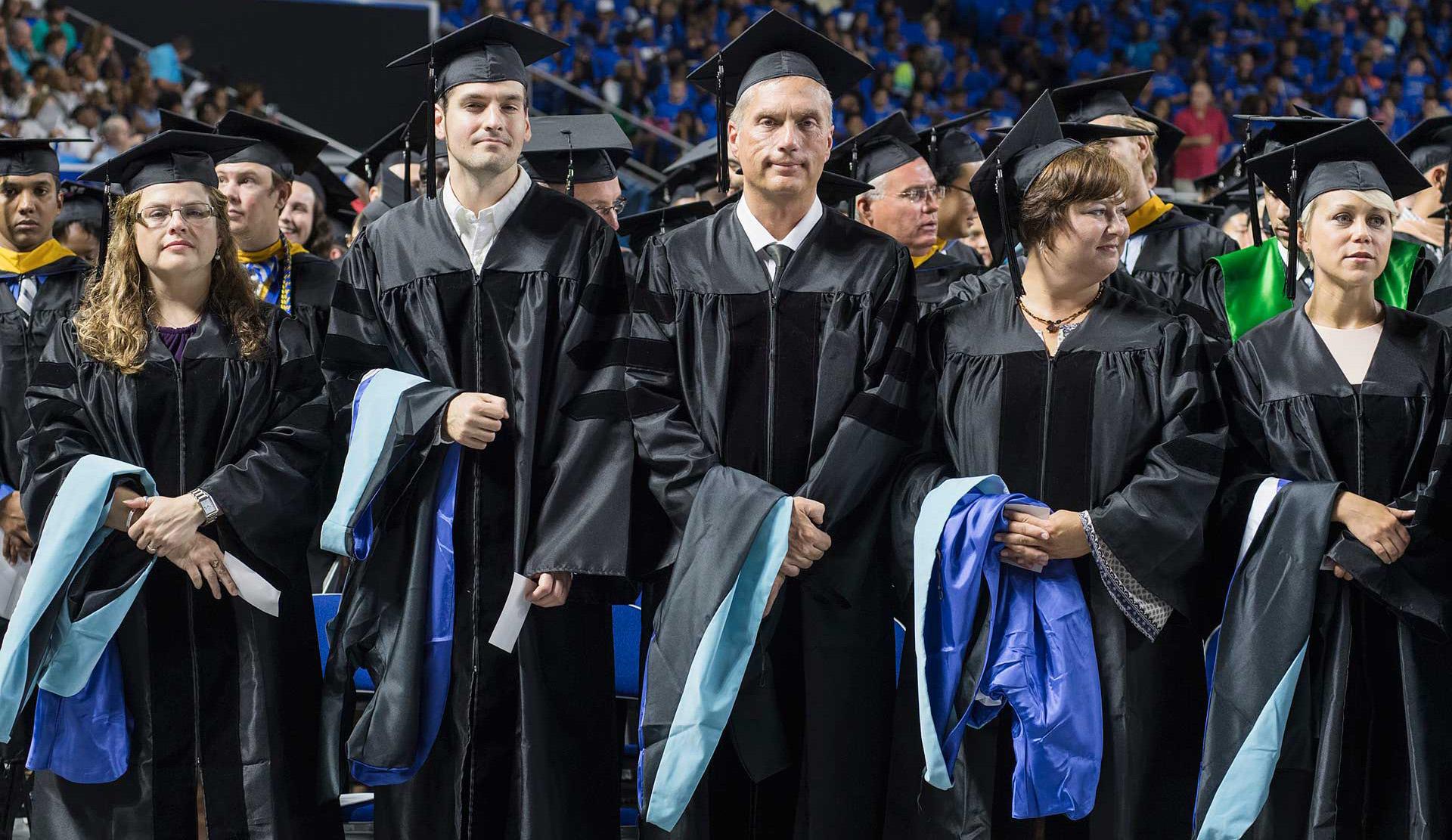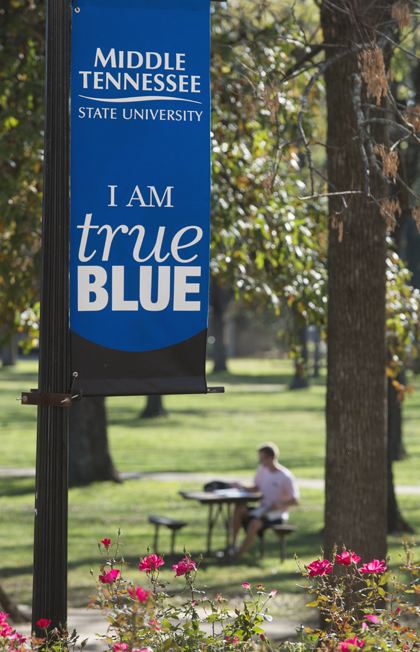
Assessment, Learning, and Student Success
MTSU's online Higher Education concentration enhances student success, applies theory, and best practices for improved practice.
Assessment, Learning, and Student Success, Higher Education Concentration, Ed.D.
MTSU's Assessment, Learning, and Student Success program offers a concentration in Higher Education. The concentration is offered 100% online and is designed for practitioners who are involved in higher education and want to take their work to the next level.
The program places emphasis on the application of essential knowledge and theory for enhancing and maximizing student success in institutions of higher learning. Throughout coursework, students apply best practices for student success, in learning, and leverage assessment to enhance their professional practice. Program faculty have extensive experience working in student success, including college and university leaders, and are committed to equipping you to affect evidence-informed improvement now, and in the future.
If you live in one of these states: AL; you may be able to attend MTSU at in-state rates under the Academic Common Market program.
News Briefs

Assistant principal says program will 'open doors,' opened eyes to 'whole new world'
Nicole Takayama, an MTSU alum, was the first person in her family to graduate from college. Now an assistant principal at a Tennessee high school, she is working on her doctorate degree at her alma mater so she can continue her success in the world of education. "I started the ALSS EdD program to earn a title and gain knowledge which would benefit me in my current career path. While the new title and knowledge will no doubt open doors at which I've been knocking, the content of that class, along with the thoughts, experiences, and perspectives shared by my classmates opened my eyes to a whole new world," she said. Takayama began her career in education as a teacher before moving into an administrator role. One of the things she values the most about the Higher Education concentration is the professors' dedication to their students and the program. "The thing I have noticed about the professors in this program that really gives it values is that they lead by example. The program is Assessment, Learning and Student Success, and all the professors I've had so far are genuinely committed to those three concepts," she said.

ALSS student applies skills learned in classroom to job in Student Success
Brelinda Johnson has worked in education for more than a decade and received her master's degree in Child Development and Family Studies at MTSU. Currently working in her alma mater's Office of Student Success, she is enrolled in the Higher Education concentration of the Assessment, Learning, and Student Success doctoral program. "Since I'm currently working in the field of student success, I've been able to utilize my career experience to directly relate to classroom material. I've been able to apply the things I've learned in the classroom to procedures in my current role," she said. Johnson, who previously taught at a high school level, said the Ed.D. Higher Education concentration of this program is useful for anyone who works in higher education. "This program is beneficial for those working in higher education. Student success is valuable in every part of the institution from academic affairs to student affairs," Johnson said.
News Briefs
Assistant principal says program will 'open doors,' opened eyes to 'whole new world'

Nicole Takayama, an MTSU alum, was the first person in her family to graduate from college. Now an assistant principal at a Tennessee high school, she is working on her doctorate degree at her alma mater so she can continue her success in the world of education. "I started the ALSS EdD program to earn a title and gain knowledge which would benefit me in my current career path. While the new title and knowledge will no doubt open doors at which I've been knocking, the content of that class, along with the thoughts, experiences, and perspectives shared by my classmates opened my eyes to a whole new world," she said. Takayama began her career in education as a teacher before moving into an administrator role. One of the things she values the most about the Higher Education concentration is the professors' dedication to their students and the program. "The thing I have noticed about the professors in this program that really gives it values is that they lead by example. The program is Assessment, Learning and Student Success, and all the professors I've had so far are genuinely committed to those three concepts," she said.
ALSS student applies skills learned in classroom to job in Student Success

Brelinda Johnson has worked in education for more than a decade and received her master's degree in Child Development and Family Studies at MTSU. Currently working in her alma mater's Office of Student Success, she is enrolled in the Higher Education concentration of the Assessment, Learning, and Student Success doctoral program. "Since I'm currently working in the field of student success, I've been able to utilize my career experience to directly relate to classroom material. I've been able to apply the things I've learned in the classroom to procedures in my current role," she said. Johnson, who previously taught at a high school level, said the Ed.D. Higher Education concentration of this program is useful for anyone who works in higher education. "This program is beneficial for those working in higher education. Student success is valuable in every part of the institution from academic affairs to student affairs," Johnson said.
Related Media

The Higher Education concentration in MTSU’s Doctorate of Education (Ed.D.) in Assessment, Learning, and Student Success was developed to allow working professionals and those who are geographically restricted to complete a terminal degree focused on one of the most critically important areas of education today – Student Success.
This concentration of the Doctorate of Education (Ed.D.) is offered 100% online bringing new opportunities to rural educators. It is ideally designed for advisors, administrators, community college and university faculty or staff.
Program graduates may also find work in:
- higher education
- research
- educational policy
- governmental agencies
- not-for-profit and philanthropic organizations
- professional development consulting, which will also contribute to improved student and school achievement.



The Assessment, Learning, and Student Success Program launched in 2013 and now offers a concentration in Higher Education. This concentration is designed for practitioners who are involved in higher education who want to take their work to the next level. The program places emphasis on application of essential knowledge and theory for enhancing and maximizing student success in institutions of higher learning. Throughout coursework, you will apply best practices for student success, for learning, and leverage assessment to enhance your professional practice. Program faculty have extensive experience working in student success, including college and university leaders, and are committed to equipping you to affect evidence-informed improvement now, and in the future.
There are several unique features that make this program appropriate for a wide range of individuals.
- It is offered 100% online making it available to any working professional without regard to geographic location.
- A Master's degree is NOT required. Students may enter this program with any baccalaureate degree.
- The Graduate Record Exam (GRE) is not required for admission.
- Up to 15 hours of previously taken graduate courses may be transferred in saving time and money.
- Up to 30 hours from an Education Specialist (Ed.S.) program may be applied as well.
- It is focused on Student Success – the course of study is practical in nature and may be immediately applied to your work.

CONTACT US

Please fill in the form below and we will contact you very soon










